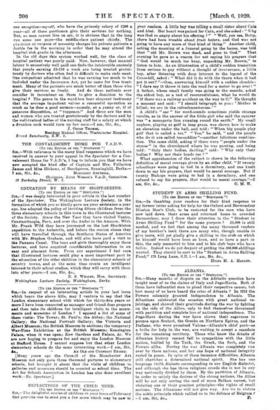REFLECTIONS OF THE CHILD MIND. (To Ma EDITOR or THE
" SPECTATOR "] Sia,—The delightful stories of children in your issue of February Slat provoke one to send you a few more which may be new to your readers. A little boy was telling a small slater about Cain and Abel. Her heart was pained for Cain, and she asked : "Why was God so angry about his offering ? " " Well, you see, Betty, there had been trouble about fruit before, and God was not going to have any more of that kind of thing." Another child, asking the meaning of a funeral going by the house, was told that " old Mr. Brown was dead, and gone to God." That evening ho gave as a. reason for not saying his prayers that " God would be much too busy, unpacking Mr. Brown," to listen, to him. As an illustration of a child's sudden transition from serious to gay without a thought of irreverence, a little boy, after listening with deep interest to the legend of the Cross-bill, asked : " What did it do. with the thorn when it had got it vat? "—then, answering himself with a sudden chuckle : "I dare say it threw it into the road for a motor to go over A father, whose small family was going to the seaside, asked the eldest boy, as a test of resourcefulness, what he would do " if there was a railway accident on the way to C." He thought a moment and said : " I should telegraph to you : ` Mother is killed; we, are in the refreshmentroom.' "
A child's " ear " for word-sounds sometimes yields strange results, as in the answer of the little-girl who said the equator was " a menagerie lion running round the earth." My small nephew, playing at golf in long grass, was shown how to make an elevation under the ball, and told : "When big people play golf that is called a tee." " Yee," he said, " and the people who do it are called tee-caddies "—another felicitims combina- tion. The same child, asking if there were "people under the stones " in the churchyard where he was passing, and being told : " Only their bodies, darling," said : " Why only their bodies ? Why not their heads too ? "
What apprehension of the. subject is shown in the following definition of moral courage given by an older child. "If twenty schoolboys were going to bed in a dormitory, and one knelt down to say his prayers, that would be moral courage. But if twenty Bishops were going to bed in a dormitory, and one refused to say his prayers, that would be moral courage."—I










































 Previous page
Previous page